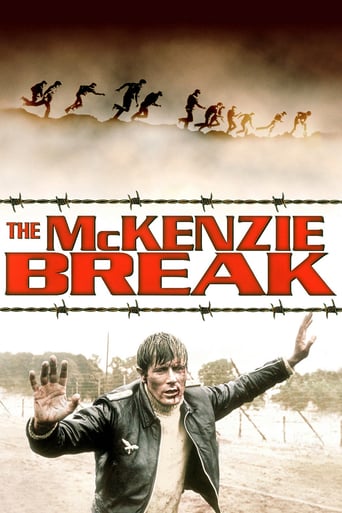moonspinner55
Brian Keith is well-cast as an Irish-born Army Captain with the British forces during WWII who is penalized for some indiscretions and busted down to Intelligence Officer at a prisoner-of-war camp in Scotland; the German inmates there take their orders from a megalomaniac Nazi Kapitänleutnant, who is supervising the digging of a tunnel underneath the barracks to freedom. Although ultimately let down by the lax editing and the careful if plodding pace, this is a well-realized vision of wartime behind barbed wire. The picture runs too long and has some beleaguered plot-threads (such as the sacrificial homosexual), though the match of wits between adept, assured Keith and smug, shrewd Helmut Griem is riveting. The locations (via Ireland and Turkey) give the film a vivid and unique look, and screenwriter William Norton's dialogue is extraordinarily direct. The finale is somewhat dragged out (and far-fetched in the bargain), yet it provides for a satisfying, sardonic close. **1/2 from ****
ianvanarkadie
An interesting war film that differs from others in a number of ways. Firstly,the plot concerns German prisoners of war held in a POW camp in Scotland planning an escape. While many films have featured Allied POWs, it's quite rare to find one that focuses on Germans held in captivity (Hardy Kruger as "The one that got away" is another example). Secondly, the Germans actually speak in German as opposed to some studio manufactured pidgin English. This adds a welcome note of authenticity so often missing from big name war movies made around the same time. The cut that I've seen on British TV was certainly subtitled. I note that another reviewer had the misfortune to watch a non-subtitled version - he has my sympathy! Another interesting point is that - in a subplot - the film has a gay German POW being persecuted and subsequently murdered by his own compatriots. Whether this actually happened and how much of the film is based on fact I'm not sure. However, the Nazi persecution of homosexuals is well-documented, but not often seen on the screen. It must have been a fairly bold move for a film made in 1970 to address this. There are some loopholes, but it remains well-acted and intriguing.
Robert D. Ruplenas
I'm always interested to see neglected movies that appear to have good credentials, but in this case the film's neglect appears justified. Evidently based on some actual incidents during WWII, the film just doesn't connect with the viewer for some reason that it is not quite clear to me. One very likely reason is that - in the print I saw on TCM, anyway - none of the scenes where the Germans talked among themselves were given titles. This interesting directorial concept - to let the non-German speaking viewer just guess from "context" what the Germans are saying to each other - is, in my book, an utter flop and helps to lock the viewer out. Also, the way the movie begins - just dropping us into a very confused situation without much setup - is disorienting. Brian Keith is pretty good here, but the reputations of "The Great Escape" and "Stalag 17" will not be challenged by this flick.
Stefan Kahrs
I only comment on one aspect of the film that I found particularly noticeable. It is about the use of foreign languages, in this case German, in American movies.There were several occasions when the German POWs were talking amongst themselves in this film, and - quite rightly - the medium of communication switched then from English to German. The problem with this is that only a few of the actors who play Germans in this film are Germans, and the result is a bit off-putting. I would categorize the German-speaking in this movie into 4 classes:1. Non-native speakers who don't have clue what they are doing: they rush their lines very quickly, but are virtually incomprehensible. It is not even German with a strong accent, it just comes across as gibberish.2. Non-native speakers who do have a clue: they speak more slowly and are understandable, but sadly they all seemed to speak with a fairly strong and easily identifiable accent.3. Germans who speak normally.4. Helmut Griem. One can tell that he is stage-trained, because he tended to speak with this peculiar cut-glass, highly articulated accent stage actors are trained to use so that the people right at the back of the theatre would still understand what they say. It doesn't sound very real though - it doesn't in English and it doesn't in German either. Perhaps Griem instinctively wanted to compensate for groups 1 and 2, and surely the director wasn't in a position to tell that he was overdoing it.What some American movie makers (and this is a prime example, another one would be 'Die Hard') fail to realise is that whenever the original version of such a film is viewed by native speakers then foreign language scenes built on such premises will not work, they just make the knowing viewer cringe. Just think about what it would do to 'The Great Escape' if some of the inmates were played instead by German actors who speak English with a strong German accent.



